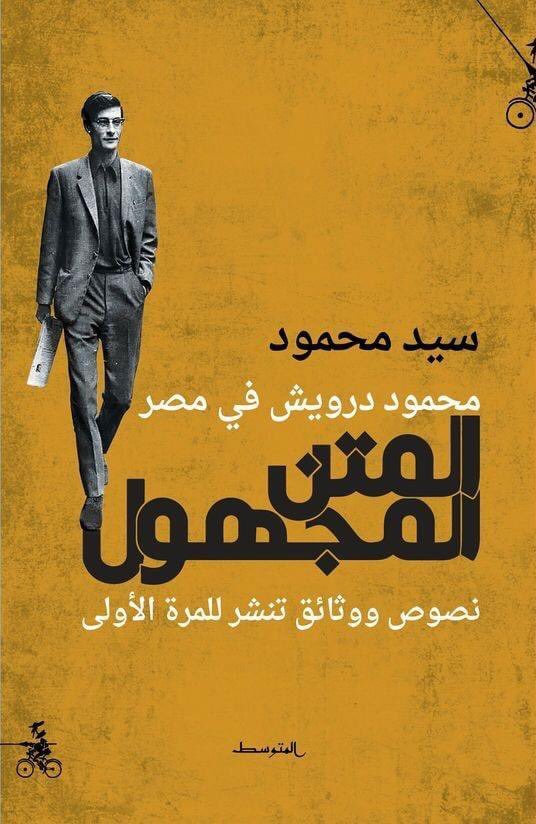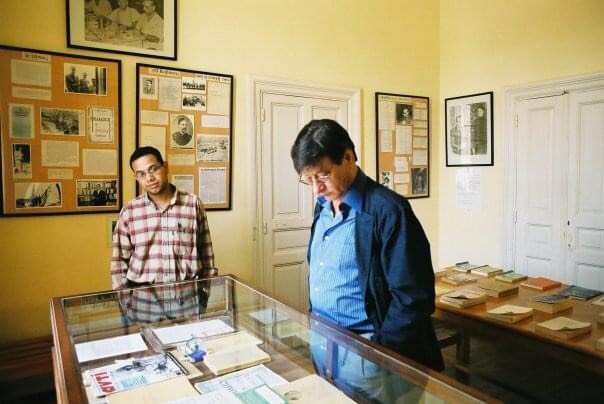In 1990, Sayed Mahmoud — at the time a fresh graduate of Cairo University’s Faculty of History — was joining a group of friends to attend the inauguration of “Palestinian Week” that was hosted at Al-Gomhouria Theatre. There he saw the legendary Palestinian leader Yasser Arafat entering the hall to be surrounded by an enchanted crowd of Palestinians.
For Mahmoud, this was no incidental cultural engagement. During his university years, Mahmoud had, like many men and women of the time, developed what he calls “the inevitable affinity to the Palestinian cause.”
“We were not the generation of the 1970s that had the Palestinian cause so much at heart, but still we were committed to this cause as a prime political issue for all of us – especially those of us with cultural interests,” Mahmoud said.
Earlier in the same year, Mahmoud had come across “a pink version” of the complete poems of Mahmoud Darwich, the poet whose name was so profoundly associated in the minds of this generation of the 1990s, with the Palestinian cause.
“It was a book with a pink cover that has been shared by all of us, especially those of the Literary Group of Cairo University. We never knew who really bought this cheap edition of the complete works of Darwich, but it had been shared by all of us somehow,” he said.
It was during the sidelines of this “Palestinian Week”, during a gathering that was organised for a group of young Egyptian poets, of which he was one, that Mahmoud encountered Darwich. The encounter, Mahmoud said, strictly affirmed the image that he had for long held of Darwich: a poet whose association with the Palestinian cause was as intense as his literary skills and his profound and sheer passion for poetry.

Sayed Mahmoud Book Cover
Mahmoud had often thought of Darwich as the poet who composed “Write down, I am an Arab” and who also wrote “Rita and the Rifle” – both being on Darwich as a Palestinian, but one on resistance and the second on love.
“I think this is part of the everlasting glory of Darwich. He was not just writing about a cause; he felt the cause that he belonged to just as fervently he felt love,” Mahmoud said.
This month, Mahmoud saw the first copies of his most recent publication, Mahmoud Darwich in Egypt: A text unknown (Mahmoud Darwich fi Masr — Almatn Al-majhol) arrive.
Published by Al-Mutawassit Books, this volume of over 300 pages recalls the details of the first encounter between the author and the poet as a footnote to a larger and much overlooked context of a few years that Darwich lived and worked in Egypt, from February 1971 to October 1973.
According to the book, it was in 1969, exactly the year that Mahmoud was born, that a few Egyptian intellectuals and diplomats worked on helping Darwich to move Egypt from the West Bank village where he lived with his family after being forced out of his hometown during the 1948 Nakba, only seven years after his birth as the second child to Selim and Hourriyah Darwich.

Sayed Mahmoud (Left) Mahmoud Darwich (Right)
“I guess that the idea to help Darwich to come over and live and work in Egypt was originally that of Gamal Abdel Nasser, but it so happened that Darwich actually arrived a few months after Nasser passed away so suddenly and so tragically in September 1970,” Mahmoud said.
According to quotes that Mahmoud includes in his book, it was not easy for Darwich to move out of his homeland. "But it was not very difficult for him to live in Egypt where he was overwhelmed by waking up to a city that only spoke Arabic and no Hebrew,” he said.
“Not so many people knew that Darwich lived and worked in Egypt for a few years in the early 1970s. He actually worked for Al-Ahram, after having worked for Dar Al-Hilal. And he did not just write poems, but literary criticism and political commentary. I thought it is a story worth telling,” Mahmoud said.
It took Mahmoud two years of diligent research to collect every piece of paper that speaks to the writing career that Darwich had in Egypt, first in Dar Al-Hilal with prominent journalist Ahmed Bahaeddine, who had a profound faith in the then young and upcoming poet, and later in Al-Ahram’s Centre for Palestinian Studies — now Al-Ahram Centre for Political and Strategic Studies.
In Cairo of the early 1970s, Mahmoud wrote, Darwich found it simply natural to live and talk about the Palestinian cause. “But he resisted being perceived as a synonym to the cause. He wanted to be seen for who he really and simply was: a Palestinian poet whose name is closely associated with his cause, and of course with resistance,” Mahmoud said.
In the over 100 pages of the book that Mahmoud dedicates to reprint some of the writings of Darwich, which had never been published before, the poet is there saying, “I don’t belong to a group of refugees who live stranded in tents … I rather belong to a people whose name is resistance … and to a homeland that has plains and mountains and a cause … I take pride in the symbols I represent … but to treat me as a legend would strip my cause of its core and of its spirit … I am just one single man of a population that is defying carnage.”
According to the book, the last days of Darwich in Egypt came before the October War that started when he and Ahmed Baheddine were in Lebanon, on the way back from a trip to Iraq. After the war, many political developments overtook Egypt. Cairo was no longer the city for Darwich to be living in — neither as a poet nor as a national symbol of his cause.
However, Mahmoud argues, no matter these political developments, including the signing of the Egypt-Israel Peace Treaty in 1979, a controversial move, Egyptians still held an “indelible affinity to the Palestinian cause.”
“I think there was also and still is a distinct public aversion towards normalisation. This was the case in the years that followed the peace treaty in the early 1980s, as it was in 1990 on the eve of the Madrid Peace Conference that came [in October 1991] in the wake of the liberation of Kuwait from the occupation ordered by Saddam Hussein, and as it is today,” Mahmoud argues.
“This is something that the Egyptian authorities have always acknowledged — this line that separates the diplomatic relations that the state established, and public rejection of normalisation,” he added.
However, Mahmoud added, in as much as Darwich would not reduce the Palestinian cause to his poems, he would not either, years after he lived Egypt, reduce the Egyptian stand to the “official” peace treaty.
“After all, in the late 1980s, as I joined university, we were celebrating the Palestinian cause and Palestinian art — not just out of passion, but out of resistance,” he said.
With the passing of years, Mahmoud added, the “curious question of ‘the 1948 Arabs’ has become a lesser question than it was in the late 1960s when members of an Egyptian literary delegation attending a cultural event in Sofia would have to be secretive about their meetings with Arab-Israeli members of an Israeli delegation who included Darwich, among others."
“Today, this is not a question. But cultural boycott is clearly still a question,” Mahmoud adds.
“The Palestinian cause is certainly still a question and Darwich, who passed away in August 2008, is still cherished for his poetry, including those poems on resistance against and defiance of Israeli occupation,” Mahmoud says.
Mahmoud is hoping that his book will recall for readers these facts, just as it would bring attention to the years the Palestinian poet spent in Egypt.
“Mahmoud Darwich in Egypt: A text unknown” is a very easy and interesting read that is as informative about a segment of the life of Darwich as it is about a segment in the life of Egypt.
Short link: